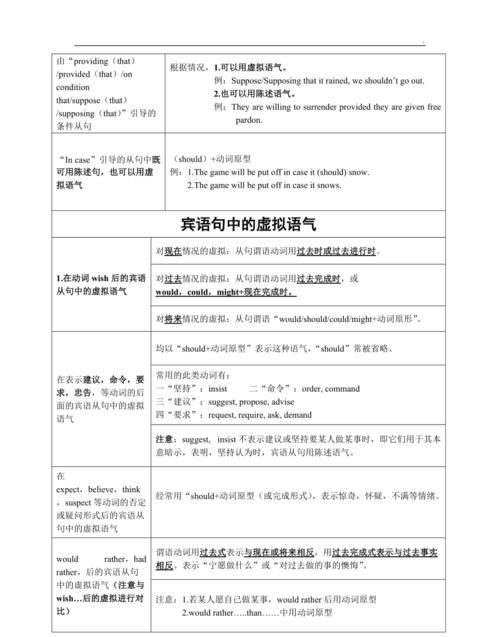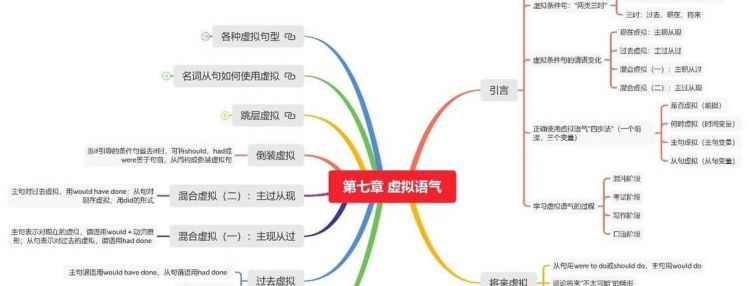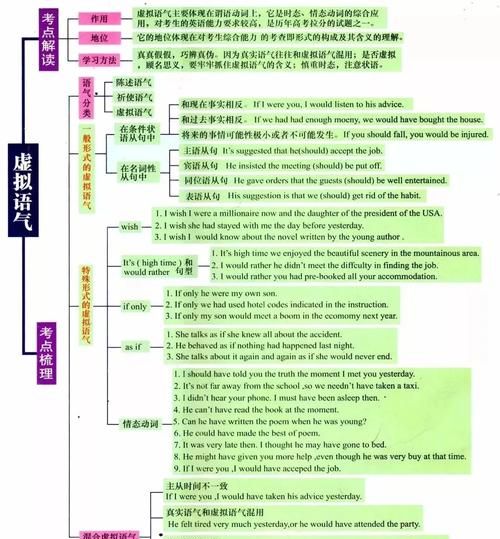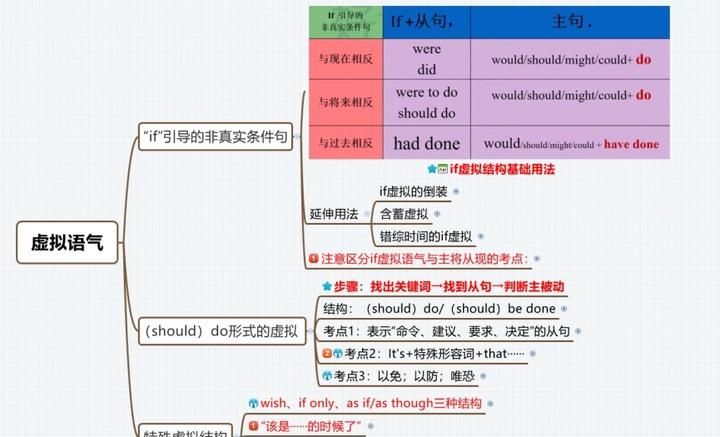本文目录
英语虚拟语气语法总结思维导图
虚拟语气是什么
在英语中,虚拟语气表示说话人的主观愿望、猜疑、建议或与事实不符的假设等,而不表示客观存在的事实。如:
If I were a bird,I would be able to fly in the air.
如果我是一只小鸟,我就能在空中飞行。
虚拟语气英语语法
虚拟语气是由句中的谓语动词的特殊形式表示出来的。
1、主语从句中的虚拟语气主要取决于某些形容词和过去分词,用来表示建议、命令、要求、惊异和失望等。其形式为:(should)+动词原形。
2、表语从句和同位语从句中的虚拟语气在表示建议、命令、主张、目的和愿望等名词后面的表语从句和同位语从句中谓语动词要求使用虚拟语气。其形式为:(should)+动词原形。
3、宾语从句的动词后所接宾语从句中的谓语动词要求用虚拟语气,用来表示建议、命令和要求等。其形式为:(should)+动词原形。
以上就是英语虚拟语气的语法知识点。在表示假想的虚假的、与事实相反的或难以实现的情况时用虚拟语气,表示主观愿望或某种强烈情感时,也可以用虚拟语气。

虚拟语气表示什么样的语气
虚拟语气的含义。
虚拟语气把动作当作一种只存在于说话人想像中的假设或推测,而不是当作客观现实中的真实事件。它表达的是怀疑、忧虑、推测、假设、想像、祝愿等。
If my father hadn’t been sick, I would have graduated from college.
I wish that my father hadn't been sick when I was going to college.
Mother told me to put on my sweater lest I should catch cold.
He suggested that we should all go to see the movie.条件句的用法。
英语中的条件句一般分为两种:真实条件句、非真实条件句。非真实条件句常用虚拟语气,包括虚拟条件句、推测条件句和错综时间条件句。
虚拟语气条件句可以分为三类:一类是叙述与现在事实相反的情况,一类是叙述与过去事实相反的情况,还有一种情况是推测将来的情况,也叫做推测条件句。它们共同的特点就是时态向前推一级。
If I were young, I could enjoy the party.
If I had a lot of money, I would buy a yacht.
If my father hadn’t been sick, I would have graduated from college.
We wouldn’t have dozed off if our teacher had spoken louder.
If it should rain tomorrow, the game would be put off.
If the Pacific Ocean were to dry up, I would change my mind.
虚拟语气的主句,可以是陈述句、疑问句、感叹句或祈使句。
Suppose you had a million dollars, what would you like to do first?
表示过去事实相反的虚拟语气条件句,可以用could have加过去分词,这里的could是情态动词,表示“能够”。
If I could have earned enough money, I would have traveled all over the world.虚拟语气用于其它从句。
虚拟语气除主要用于条件从句即状语从句外,还可用于主语从句、宾语从句、表语从句、定语从句等。
用作动词wish的宾语从句,表示愿望,常省去从属连接词that。这种从句的谓语动词可用过去式,表示与现在事实相反,亦可用过去完成式,表示与过去事实相反。I wish that Robbie and Alexandra were here.
I wish you would go with us tomorrow.
I wish she had taken my advice.
谓语用should+动词原形或只用动词原形的that从句,作为demand,suggest,propose,order,arrange,insist,command,require,desire等动词的宾语。如:
He determined that she go at once.
I prefer that such comments should cease.
She insisted that the seats should be booked in advance.
He suggested that I should be saving some of the money.
He found it necessary that we should learn English well.
He thinks it of great importance that a person should be honest.(of great importance等于very important)
也可以用would rather,would sooner等表示愿望,但其宾语从句常用虚拟过去式。
I would rather you came tomorrow.
I’d sooner she left the heavy end of the work to someone else.
有些动词,如think,expect,believe,其否定式的宾语从句亦可用should+动词原形。
Never did I think that he should refuse.
She did not expect that you should come.
用作某些形容词或相当于形容词的过去分词的补语的that从句,其谓语是should+动词原形或should+have +过去分词。
I was glad that he should go.
I’m ashamed you should have done such a thing.
非真实条件句如省去结果主句,则常表示一种不可能实现的愿望。这种条件句常用if only来引导。如:
If only you would listen to reason.
If only he were here.
If I had never married.
If at least it had some artistic merit.
If only I could smash the ground with my fist and make the oil flow.
虚拟语气可以用于It’s time that的结构中,谓语动词要用过去式,be动词的过去式要用were,表示“是该做某事的时候了”,如:
It’s high time that we were off.
It’s time that we had dinner.
It’s time that somebody taught you to behave yourself.
Isn’t it about time that he were in bed?
这里的过去式也可以用should加动词原形来表示,这里的should是不能省略的。
It’s about time that we should go to bed.
It’s quite time that she should wash her clothes.
It’s almost time that we should be leaving.
虚拟语气也可以用在由关系代词引导的定语从句中。A man might pass for insane who should see things as they are.
虚拟语气可以用于其它连接词引导的状语从句中,如:The peasants prepared to feed the city when it should be freed.
Lest you should not have heard all, I shall begin at the beginning.
Unless I were well, I wouldn’t be at school.
Suppose you were given a chance to study in the USA, would you accept?
In case I forget, please remind me of my promise.
Susan is walking slowly as if she were tired.
Though everyone desert you, I won’t.有不少情态动词也可以用于虚拟语气中:would表示一种情态意义,表示主语的意愿和意图,should也可以表示意愿或意见,could可以表示能力,如体能、技能或可能也可以表示允许,might则可以表示可能,may是一种特殊的虚拟语气,可以用在从句中表示目的或让步。如:
It might help a little if only you would keep clean.
If you left at ten, you should arrive in time.
I couldn’t be angry with him if I tried to.
If I hadn’t warned you, you could have been killed.
If he were wise, he should have come to see me.
He died in order that others might be saved.
We must observe the customs of the country, whatever they may be.
May you be happy!
Long may you live!动词原形也是一种虚拟语气,称为虚拟语气的现在时,可以用于条件从句、目的从句、让步从句、主语从句、宾语从句或独立句中(表示愿望)。If the news be true, that will be a serious matter.
Let us act and not shrink for fear our motives be misunderstood.
All magnets behave the same, be they large or small.
She’ll be sixteen years old, come May.
It is very important that you be honest.
I suggested that everyone help in some way.
I insisted that she consult a doctor.
Long live the People’s Republic of China!
希望我能帮助你解疑释惑。

英语中虚拟语气指什么
1、虚拟语气是说话者用来表示假设,或难以实现的情况,而非客观存在的事实,所陈述的是一个条件,不一定是事实,甚至完全与事实相反。此外如需表达主观愿望或某种强烈的感情时,也可用虚拟语气。虚拟语气通过谓语动词的特殊形式来表示。
2、例句:If I were you, I should study English.如果我是你,我就学英语了。
3、英语中的语气分为陈述语气、祈使语气、虚拟语气、疑问语气和感叹语气五类。

情态动词和虚拟语气的知识点
一、与现在事实相反
若与现在事实相反,虚拟语气的条件从句的谓语用过去式(be通常用were),主句谓语用“should (would, could, might)+动词原形”。如:
If you took a taxi,you'd get there quicker. 如果你坐出租车去,你可以快一点到那里。(但你不坐)
If I knew her number I could ring her up. 要是我知道她的电话号码,我就可以给她打电话了。(可惜我不知道)
二、与过去事实相反
若与过去事实相反,虚拟语气的条件从句的谓语用过去完成时(had+过去分词),主句谓语用“should (would, could, might)+have+过去分词”。如:
If I'd left sooner,I'd have been on time. 要是我早点动身,我就准时到了。(但我动身太迟了)
If we had found him earlier we could have saved his life. 要是我们当时早点找到他的话,我们就可以救活他。(可惜我们找到他太晚了)
三、与将来事实相反
若与将来事实相反,条件从句的谓语用过去式(be通常用were),主句谓语用“should (would, could, might)+动词原形”。如:
If he went,would you go too? 如果他去,你也去吗?(大概他不会去)
If I asked him,I'm sure he'd help us. 如果我向他提出要求,肯定他会帮助我们。(不过我不打算这样做)
注意与说明:对于与将来事实相反的情形,请注意以下几点:
一是这里说的与将来事实相反,实为对将来情况的推测;
二是此用法中的条件从句谓语除用过去式外,有时也用“should+动词原形”(表示可能性极小,常译为“万一”)或“were to+动词原形”(表示与将来事实相反的假设);
三是当条件从句使用“should+动词原形”这样的谓语时,主句谓语除可用“should (would, could, might)+动词原形”这样的虚拟语气外,也可用陈述语气或祈使语气。如:
I should see him, I'll tell him. 万一我见到他,我就告诉他。
If it should rain tomorrow, don’t expect me. 万一明天下雨,就别等我了

以上就是关于虚拟语气知识框图,英语虚拟语气语法总结思维导图的全部内容,以及虚拟语气知识框图 的相关内容,希望能够帮到您。

